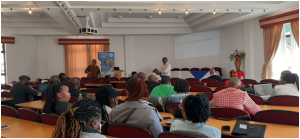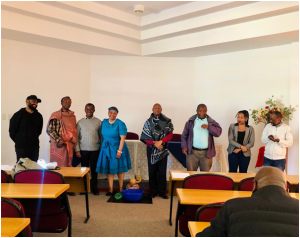From 7 – 8 October 2023, Dr Munyaradzi Mushonga, the Global Academic Director of DIN, was in the Kingdom of Lesotho to launch the DIN Lesotho Chapter. The host was the National University of Lesotho (NUL), the country’s premier institution and only public university (https://www.nul.ls/).
The Faculty of Humanities (https://www.nul.ls/humanities/), led by its Dean, Professor Paul Leshota and the faculty’s postgraduate co-ordinator Professor ’Mamoleba Kolobe, together with the Academic Forum for Development of Lesotho (AfdeL) led by its Secretary General Professor Tsepo Mokuku hosted the Global Academic Director of DIN.
The launch of the DIN Lesotho Chapter was preceded by a public lecture on Decolonizing Knowledge and a Workshop on Decolonizing The Mind, both conducted by Dr Munyaradzi Mushonga. The Global Academic Director of DIN kicked off the public lecture by paying respects to the Elders of the Basotho nation, past, present and emerging, and challenged those present to take pride in their ways of living, doing, knowing, thinking, praying, dancing, and singing as these were valid and legitimate forms of knowledge without which there would be no living. The lecture touched on a number of key aspects of decolonizing knowledge namely: what is, and what is not decoloniality; why decoloniality in the 21st century; how knowledge is colonized; how to decolonize knowledge; and the place of knowledge and decoloniality in development. Dr Mushonga concluded the lecture by calling on NUL and Lesotho to embark on the journey of unlearning in order to relearn what Western modernity taught them to despise.
In the workshop, Dr Mushonga took the NUL community on a journey of how to decolonize the mind. He offered Decolonizing the Mind (DTM) as a school of science that argues that scientific knowledge has been colonized and requires root and branch decolonization and reconstitution. Drawing from Sandew Hira’s tour de force, Decolonizing The Mind: A guide to decolonial theory and practice (2023) (https://shop.ihrc.org/products/decolonizing-the-mind-a-guide-to-decolonial-theory-and-practice-sandew-hira), Dr Munyaradzi Mushonga demonstrated how knowledge production has been deployed in the colonization of the mind. He also offered several pathways to the decolonization of the mind.
Lecture and Workshop Feedback/Evaluation
The evaluation/feedback on both the lecture and the workshop was framed around five questions developed by the co-ordinating team led by Professor Paul Leshota, Professor Tsepo Moku and Professor ’Mamoleba Kolobe:
- What were your expectation(s) about the decoloniality seminar?
- Mention a maximum of three important things that you learned from the workshop?
- State three ways in which decoloniality may be relevant for NUL?
- State three ways in which decoloniality may be relevant for Lesotho.
- What is the most important thing about decoloniality for you?
Diverse responses were generated from these five questions. Because of want of space, only one response is picked from each question. Overall, the participates were not only satisfied with the knowledge they gained, but also the possible routes to exit the epistemic/existential prison. In response to question 1, one participant responded, “Decoloniality should [be] spread throughout the whole continent of Africa, in countries, villages and communities as well. It should be explored with all the media platforms, as well as in formal, informal and non-formal academia approach”. In response to question 2, one participant wrote, “Decoloniality occurs at different levels; personal, structural, systemic, and otherwise”. In response to question 3, one participant wrote, “Establishment of decolonial institute or centre; fortnightly presentations on decoloniality; and establishment of decoloniality journals to publish decolonial-driven research”. To question 4, one participant responded, “African spirituality will no longer be discriminated because of religion; Basotho will know that knowledge is not centred around Eurocentric ideas; Basotho do not have to depend on Western, European and Eastern countries”. To question 5, one participant stated, “It is slowly liberating my mind and has rekindled within me the thirst to know and research about Lesotho”. In short, the aggregate of the responses demonstrate that the lecture and the workshop were a great success, and the DIN Foundation needs to build on the momentum.

The Decolonial International Network Lesotho Chapter Takes Root
The enthusiasm and the robust engagements that followed the public lecture and the workshop were enough to set in motion the constitution of the chapter, which the participants hastily named as DIN Lesotho Chapter. The formulation of the chapter revolved around the following three key questions in their English and Sesotho versions.
1) How might Decoloniality be defined in Sesotho? (Re ka hlalosa ‘decoloniality’ joang ka Sesotho?)
2) Suggest decoloniality themes that should guide the DIN Lesotho Chapter activities? (Ke lintlhakholo li fe tsa ‘decoloniality’ tse ka tataisang Mokhatlo oa DIN Lesotho ts’ebetsong ea ona?)
3) Suggest decolonial activities that the DIN Lesotho Chapter should carry out? (Ke lits’ebetso tsa mofuta o fe tsa ‘decoloniality’ tseo mokhatlo oa DIN Lesotho o ka li etsang?).
These questions were debated in three separate group discussions followed by group presentations. After the presentations, a strong 13-member DIN Lesotho Chapter Steering Committee was established. The committee is made up of representatives from NUL’s seven faculties and other stakeholders. As at 8 September, following made up the Committee: Education (Dr Mahao Mahao), Law (Dr Letadzo Kometsi), Humanities (Prof. ’Mamoleba Kolobe; Dr Raphael Thuube; Dr Sean Maliehe; Prof. Paul Leshota (Dean ex-Officio), Science & Technology (Dr Nthatamele Maliehe), Undergraduate Students (Mr Mphou Setha), Postgraduate Students (Ms Makabelo Kobisi), Non-Academic Staff (Mr John Mofomobe), AfdeL (Prof. Tsepo Mokuku), with the faculties of Agriculture, Health Sciences, and Social Science yet to submit names.

On Wednesday, 18 October 2023, the DIN Lesotho Chapter Decolonial Ad hoc. Committee met to discuss the way forward. It came up with several resolutions that it will take to the Steering Committee for deliberations and ratification. The Global Academic Director is happy to report that DIN Lesotho Chapter indicated its readiness to host its first Decolonial School in the not-too-distant future.
The Sun that went down with the arrival of a ‘Civilization of Death’ is rising again in the Kingdom of Lesotho.
